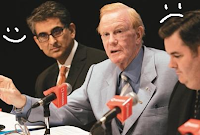
Michael Sabia, former head of BCE and Nadir Mohamed, recently crowned CEO of Rogers had their compensation packages profiled in the Globe and Mail today.
Michael Sabia, caught in a storm of controversy over his sudden appointment as chief of the Caisse de dépôt et placement du Québec, pocketed $21-million after stepping down as the head of BCE Inc. last summer.
Mr. Sabia was named chief of the Quebec pension fund manager last month. The speed of his appointment, only one week after the provincial government named Robert Tessier chairman, launched a flurry of criticism that Mr. Sabia had short-circuited the selection process as the favoured candidate of Quebec Premier Jean Charest.
In an effort to defuse the controversy, Mr. Sabia last week said he would give up his right to any bonuses in his first two years on the job, as well as a $235,000-a-year pension and any golden handshake on his departure.
 Mr. Sabia's massive separation package from BCE includes severance equal to three years' salary, and short-term incentives amounting to more than $9-million, according to a regulatory filing on Wednesday. It also contains a $1.3-million payment related to BCE's privatization deal, which collapsed; $3.1-million of incentive pay; $2.9-million in accelerated vesting of stock options; and a base salary up to July 11 of $729,000.
Mr. Sabia's massive separation package from BCE includes severance equal to three years' salary, and short-term incentives amounting to more than $9-million, according to a regulatory filing on Wednesday. It also contains a $1.3-million payment related to BCE's privatization deal, which collapsed; $3.1-million of incentive pay; $2.9-million in accelerated vesting of stock options; and a base salary up to July 11 of $729,000.Mr. Sabia was ousted from the top job at the communications giant by the Ontario Teachers' Pension Plan and its partners, which planned to buy BCE for $35-billion. As a condition of the deal, the buyers wanted Bell Canada executive George Cope to take the reins even before the deal closed.
Although the leveraged buyout eventually fell through, Mr. Cope, president and chief executive officer of both BCE and Bell Canada since last July, has been implementing many of the changes the investment group had planned.
Mr. Cope received total compensation of $4.6-million in 2008, including a $2-million recognition and retention payment related to the privatization effort and a $1.2-million incentive payment. His base salary was $959,000.
Mr. Cope also received options for 790,000 BCE shares, bringing the total value of his unvested options to $12.8-million.
Bell Canada rival Rogers Communications Inc. has also provided details of its executive compensation for 2008.
Company founder Ted Rogers, who died on Dec. 2, received total compensation of $21.5-million, of which $14.6-million represented the value of benefits payable to his wife, Loretta.
Nadir Mohamed, who was promoted to CEO this week, received total compensation last year of $6.5-million for serving as president and chief operating officer of the communications group. Salary comprised $853,900 of that amount, share-based awards $3.5-million, option-based rewards $1-million, and an annual incentive of $1.1-million.
Mr. Mohamed also holds vested options worth $5.8-million and unvested options worth $2.8-million.
Edward Rogers, the founder's son and early contender for the top job, had in-the-money options worth $34.6-million at the end of the year. His sister, Melinda, who serves as senior vice-president of strategy and development, held $5.9-million worth of in-the-money options.
Read Full Post...














